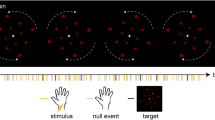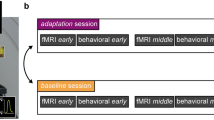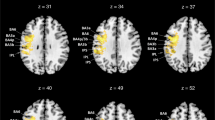Abstract
LACK of awareness of touch associated with brain damage may transiently recover after stimulation of the vestibular system1,2. We used positron emission tomographic regional cerebral blood flow measurements to study the neurophysiological effect of vestibular stimulation on touch imperception in a subject with a right brain lesion. We tested the hypothesis that the vestibular system aids conscious tactile perception by introducing a bias in the neural system subserving body representation. We show that in normal subjects touch and vestibular signals share projections to the puta-men, insula, somatosensory area II, premotor cortex and supra-marginal gyrus. In our patient a subset of these regions (right putamen and insula) was spared by the lesion and was maximally active when touch and vestibular stimulations were combined. These results support the suggestion that our phenomenological consciousness is associated with activation in circumscribed brain areas specific to the particular sensation of which we are aware.
This is a preview of subscription content, access via your institution
Access options
Subscribe to this journal
Receive 51 print issues and online access
$199.00 per year
only $3.90 per issue
Buy this article
- Purchase on Springer Link
- Instant access to full article PDF
Prices may be subject to local taxes which are calculated during checkout
Similar content being viewed by others
References
Vallar, G. et al. Cortex 26, 123–131 (1990).
Vallar, G., Bottini, G., Rusconi, M. L. & Sterzi, R. Brain 116, 71–86 (1993).
Raichle, M. in Handbook of Physiology (eds Mouncastle, V. B., Plum, F. & Geiger, S. R.) 643–674 (American Physiological Society, Bethesda, MD, 1987).
Silbersweig, D. A. et al. J. cereb. Blood Flow Metab. 3, 617–629 (1993).
Lidvall, H. F. Acta Otolaryngol. 53, 33–44 (1962).
Friston, K. J. et al. J. cereb. Blood Flow Metab. 10, 458–466 (1990).
Friston, K. J., Frith, C. D., Liddle, P. F. & Frackowiak, R. S. J. J. cereb. Blood Flow Metab. 11, 690–699 (1991).
Bottini, G. et al. Exp Brain Res. 99, 164–169 (1994).
Mesulam, M.-M. & Mufson, E. J. in Association and Auditory Cortices (eds Peters, A. & Jones, E. G.) 179–226 (Plenum, New York, 1985).
Burton, H., Videen, T. O. & Raichle, M. E. Somatosens. Motor Res. 10, 297–308 (1993).
Barbur, J. L., Watson, J. D. G., Frackowiak, R. S. J. & Zeki, S. Brain 116, 1293–1302 (1993).
Talairach, J. & Tournoux, P. A Co-planar Stereotactic Atlas of the Human Brain (Thieme, Stuttgart, 1988).
Townsend, D. W. et al. IEEE Trans. med. Imaging 10, 505–512 (1991).
Spinks, T. J. et al. Phys. med. Biol. 37, 1637–1655 (1992).
Fox, P. T. & Mintun, M. A. J. nucl. Med. 30, 141–149 (1989).
Friston, K. J. et al. J. cereb. Blood Flow Metab. 9, 690–695 (1989).
Author information
Authors and Affiliations
Rights and permissions
About this article
Cite this article
Bottini, G., Paulesu, E., Sterzi, R. et al. Modulation of conscious experience by peripheral sensory stimuli. Nature 376, 778–781 (1995). https://doi.org/10.1038/376778a0
Received:
Accepted:
Issue Date:
DOI: https://doi.org/10.1038/376778a0
This article is cited by
-
The Effect of Somatosensorial System on Vestibular System
Indian Journal of Otolaryngology and Head & Neck Surgery (2022)
-
Auditory perception is influenced by the orientation of the trunk relative to a sound source
Experimental Brain Research (2021)
-
Secondary somatosensory cortex of primates: beyond body maps, toward conscious self-in-the-world maps
Experimental Brain Research (2020)
-
Somatosensory modulation of perceptual vestibular detection
Experimental Brain Research (2018)
-
Multisensory effects on somatosensation: a trimodal visuo-vestibular-tactile interaction
Scientific Reports (2016)
Comments
By submitting a comment you agree to abide by our Terms and Community Guidelines. If you find something abusive or that does not comply with our terms or guidelines please flag it as inappropriate.



